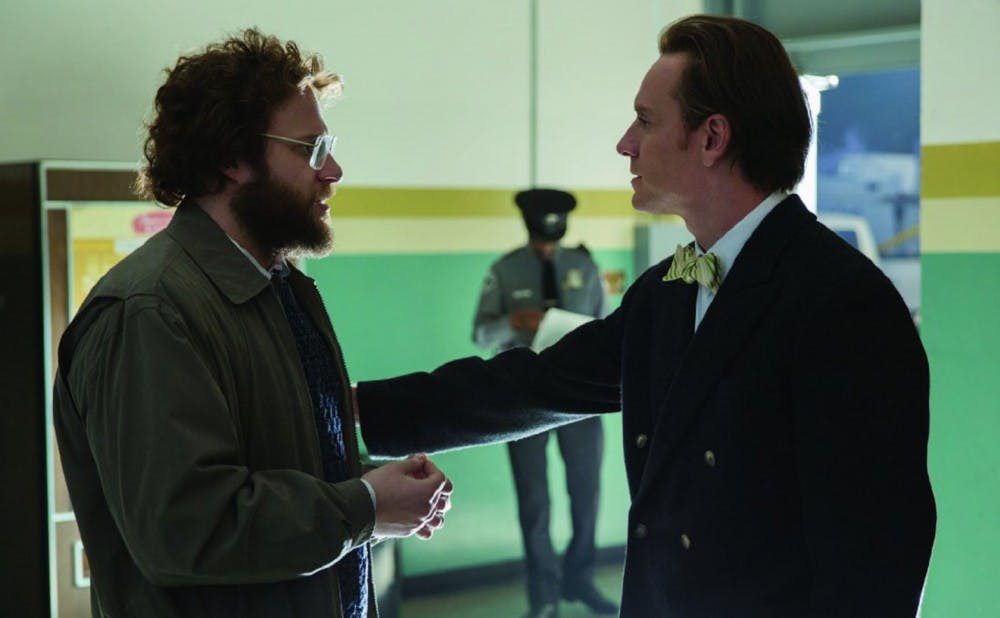Grade: A
Success and failure. Compulsion and determination. A man so complex can be so easily defined through these two groupings, and Steve Jobs is the prime example.
In “Steve Jobs,” Aaron Sorkin does what he does best by unveiling a complex character through intense scenes fueled by dialogue and a series of dense characterization.
Through a band of fantastic actors and actresses — Michael Fassbender, Kate Winslet, Jeff Daniels and Seth Rogen — the compulsive and self-destructive nature of Jobs is revealed.
Fassbender does a fantastic job of portraying Job’s intensity. Though a sequence of three primary scenes, or three famous product launches he conducted, the viewer learns it is this intensity that yielded great success — and great failure.
The man hailed for creating and saving Apple Inc. was his own worst enemy, as he often saw only one side — his.
Surrounded by great engineers and designers, he couldn’t submit to them. When something was perfect, he believed he could make it better.
His drive for perfection came at great cost.
Through the charting of the Macintosh product launch and the NeXT product launch, we learn the greatest cost was his ability to communicate and interact with others, which included his own child.
This isn’t a biography done through chronological timing of the complete story of Jobs and Apple, and while at first I was disappointed by that, I began to realize the beauty.
“Jobs” was a 2013 film starring Ashton Kutcher as Jobs. It flopped. I wasted two hours of my life watching it to prepare for “Steve Jobs.”
Despite Kutcher’s unconvincing and terrible acting, “Jobs” tried to unveil the complex, compulsive nature of Steve Jobs through a chronological tale of the creation of Apple and its products from beginning to end.
But it was just that — a tale.
That is where “Jobs” failed miserably. Barely delving into his rejection of his daughter, Lisa, the 2013 film only showed how Jobs’ compulsive and inferiority complex led to his dismissal from Apple. It was more of a montage of tribute, a finely tuned obituary, the main goal to paint a picture of genius and success.
In “Jobs,” it’s everyone else’s fault. In “Steve Jobs,” the fault is on Jobs’ personality.
In actuality, the best way to tell the tale of Jobs is to show his reactions and actions during his product launches.
We learn the driving force of Jobs’ determination for success is his adoption and that it is also the leading cause of his compulsive nature and failures.
We learn how John Scully, Apple’s CEO, though he believed he was a father-figure for Jobs, could 100 percent cause Jobs’ failure.
We learn his manipulation techniques in the NeXT launch and that maybe, just maybe, he perfectly planned the product’s embarrassing failure to launch his greatest success.
We learn that despite it all, his relationship, or lack thereof, with Lisa defines Jobs entirely. Every move he makes, every character attribute, they all go back to Lisa.
How can a man worth millions leave his child and her mother to survive on welfare?
How can a man of genius create an algorithm to determine that 28 percent of men could be the father of his child?
Though technically unrelated to computers, the answers to these questions connect to the failure of the Macintosh and NeXT.
With Sorkin’s creating the script, everything you learn about Jobs is created in the exchanges and tension between the supporting characters to Jobs’ life.
His implementation of Winslet as Joanna Hoffman, Jobs’ closet confidant and most respected friend, shows just how much “Jobs” missed the point of its main character.
Like Sorkin or hate him, he has a way to gorgeously define and unveil a character through simple plots driven by dialogue.
Sorkin doesn’t need action sequences or crisis. Give him a simple backdrop and a set of extraordinary actors and he can delve into the life of one of the most complex and successful men of our time.
To understand so much about Jobs in two hours without being overwhelmed, see this film. We use his products every day, but there were many times, we may not have had them at all.
Success. Failure. Compulsion. Determination. To create the genius that is Jobs, it’s quite possible to need them all.
Allison Wagner




